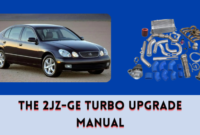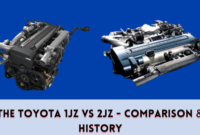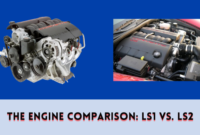The Four Most Common GM 2.4L Ecotec Engine Issues. The GM 2.4L Ecotec engine debuted in 2006 and was used in the Polaris Slingshot until 2019. Many Chevy, Buick, Saturn, GM, and Pontiac cars use 2.4 Ecotec engines. Given its modest NA configuration, the engine produces a decent 164-182 horsepower. It also has an efficient engine with good fuel economy. However, no engine is perfect, and this is no exception. In this post, we’ll look at a few typical issues with GM’s 2.4 Ecotec engines, as well as general reliability.
Check out our 4 Common GM 2.2L Ecotec Common Problems Guide for additional related Chevy Ecotec information.
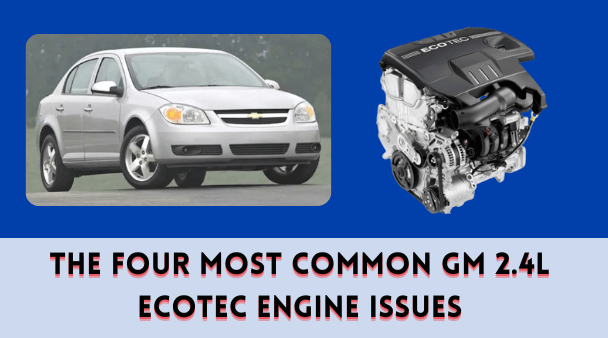
What Vehicles Make Use of the 2.4L Ecotec?
This engine can be found in a variety of Chevy, Buick, Saturn, Pontiac, and GM models. During its decade-plus run, the 2.4 Ecotec received various modifications as well. Within the Ecotec family, each 2.4L engine has its own engine code. Here is a list of some models that use the engine:
*Please bear with us as we go through this lengthy list. It’s critical to distinguish these 2.4L inline-4 engine versions. Some common issues may affect specific versions more than others, and we’ll clarify them as we go along.
Engine: GM 2.4 LE5
- Chevy Cobalt SS / Sport 2006-2008
- 2006-2008 Chevrolet HHR
- 2008-2012 Chevrolet Malibu
- Pontiac G5 (2006-2008 model year)
- G6 Pontiac 2006-2009
- Pontiac Solstice 2006-2009
- 2006-2007 Ion of Saturn
- 2006-2009 Saturn Sky
- 2008-2009 Saturn Aura
- Saturn Vue (2008-2009 model year)
LAT 2.4L Ecotec
The 2.4 LAT GM Ecotec engine is the same as the old LE5 engine. GM, on the other hand, utilizes LAT as the classification for mid-hybrid vehicles. It is available in the following models:
- Saturn Vue Green Line Hybrid 2007-2008
- Chevy Malibu Hybrid 2008-2009
GM 2.4L LE9
LE9 engines are basically E85 versions of the original LE5 Ecotec engines. They come in the following styles:
- 2009-2011 Chevrolet HHR
- 2010-2012 Chevrolet Malibu
- Polaris Slingshot 2014-2019
Engine Ecotec LAF
LAF 2.4L Ecotec engines first appeared in 2010. The basic concept is the same, but GM switched to direct fuel injection. In addition, they boosted compression and redesigned the pistons. The 2.4 Ecotec LAF engine is available in the following models:
- 2010-2011 Chevrolet Equinox
- 2011-2014 Chevrolet Orlando
- Chevy Captiva 2011
- Terrain 2010-2011 GMC
- Buick Lacrosse 2010-2011
- Buick Regal 2011
LEA 2.4L Ecotec
LEA Ecotec engines are built on the same platform as previous LAF engines. The greater compression and other changes are shared by the LEA 2.4L. It is, however, an E85-compatible variation found in the following vehicles:
- Chevy Captiva Sport 2012-2017
- 2012-2017 Chevrolet Equinox
- Buick Regal 2013, 2014, 2015, 2016, and 2017
- 2012-2017 The Buick Verano
- Terrain 2012-2017 GMC Terrain
Engine: GM 2.4 LUK
Okay, here is the last one. The 2.4L LUK variations are the same as the previous LEA engines, but the LUK incorporates mild-hybrid eAssist systems.
- Buick Lacrosse 2012-2016
- 2012-2017 Buick Regal
- Chevy Malibu ECO 2013-2014
- 2014 Chevrolet Impala
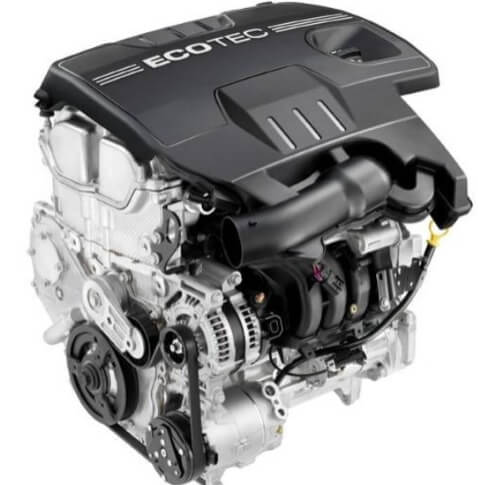
Four Common 2.4 Ecotec Engine Issues
Sorry for the lengthy list of engines. It is necessary to distinguish so that we can address a few issues that affect particular variations more than others. Anyway, some common issues with the GM/Chevy 2.4L Ecotec engine are as follows:
- Chain of events
- Consumption of oil
- Carbon accumulation
- Oil spills
Throughout this essay, we’ll go through these 2.4L Ecotec issues in detail. Finally, we’ll wind things off with some general observations on 2.4L reliability. Before we begin, it’s a good idea to go over a few key points. These are the most often encountered problems. This does not necessarily imply that they are widespread failures affecting a big number of engines. Instead, when issues do arise, these are a few prevalent spots on the GM 2.4 Ecotec.
Furthermore, some varieties are more or less susceptible to these difficulties. We’ll endeavor to clarify where possible. Another thing to keep in mind is that some GM 2.4L engines are 10-15 years old or older. Engines may become more prone to difficulties as they age. Because of their age, newer 2.4L Ecotec models are likely to be more reliable in the near run. That being said, let’s get started on the GM 2.4 Ecotec engine issues listed above.
1) 2.4 Failures of the Ecotec Timing Chain
Timing chains are without a doubt one of the most discussed issues with the GM 2.4 Ecotec engine. Keep in mind that the internet has a propensity to exaggerate things. This is especially true when dealing with potentially costly difficulties. However, timing chain failures are still a pretty prevalent problem. It mostly affects older engines because GM ultimately replaced several sections. Chevrolet Equinox and Malibu cars appear to be the most vulnerable.
The tensioners and top bolt are the major issue with 2.4L Ecotec timing chains. When the tensioner fails, the timing chain becomes slack. As a result, the timing chain may jump a few teeth. To compound problems, the 2.4 Ecotec is an interference engine. This indicates that the travel of the valves and pistons overlaps.
When timing changes, the valves can come into contact with the pistons. If this happens, some valves are likely to deform or shatter, resulting in costly repairs. Check the timing chain on the GM 2.4L Ecotec for any marks/scuffing or slack. This will give you an excellent indication of the condition of the timing chain components. Issues can arise sooner, but keep a look out for them after 100,000 miles. Here’s a little video about the issue.
2.4L Ecotec Timing Chain Issues
The following are some symptoms of timing chain difficulties on the GM 2.4 Ecotec engine:
- Engine error codes
- rattling noises
- Misfires
- Ineffective operation
One of the first indications is frequently rattling noises from the engine. You’ll notice the chain rattling about at idle when it becomes slack. If the timing genuinely jumps, you’ll notice fault codes, misfires, and poor overall performance. In extreme circumstances where timing is thrown off, you will notice even more symptoms. The 2.4L Ecotec valves and pistons could collide, causing additional damage.
Timing Chain Replacement for GM 2.4 Inline-4
Again, it’s a good idea to check the timing chain on a regular basis. The valve cover comes off quickly and easily, allowing you to inspect the chain. This may assist you in detecting any 2.4 Ecotec timing chain issues early enough to prevent further damage.
A timing chain kit typically costs between $150 and $300, making it affordable for the do-it-yourself audience. However, because it is a lengthy repair, labor expenses might soon add $500-800 to the price.
In the worst-case scenario, you may end up with cracked 2.4L valves, which will be an expensive fix. Depending on the scope of the work, replacing valves and the timing chain may easily cost $1,500 or more.
2) High Oil Consumption GM 2.4L Ecotec
High oil consumption appears to predominantly affect Chevy Equinox and Malibu models, as with timing chain difficulties. However, this could be a problem in a variety of years and models. It’s a prevalent and severe enough problem that excessive oil use has resulted in some lawsuits. Fortunately, GM provided some extended warranties and updates to address the issues.
In any case, 2.4 Ecotec engines are prone to high oil consumption due to piston ring issues. Excess oil from piston oil spray nozzles can enter the combustion chamber and pass through the piston rings. It is then burned off, which isn’t a big deal in and of itself.
However, some cases of excessive oil usage can lead to owners not topping off on oil regularly enough. Piston ring wear may also cause major issues with the 2.4L Ecotec in the long run. If the rings wear and leave a significant gap, you may begin to lose compression.
Anyway, for the great majority of 2.4 Ecotec engines on the road today, this should be a non-issue. The majority of cases of excessive oil use were detected and fixed under warranty. However, some engines may have slipped through the cracks.
GM 2.4 Oil Consumption Correction
In all engines, some oil use is normal. If you’re seeing excessive consumption (1+ quarts every 1,000 to 2,000 miles), you should investigate more. The issue could be with the piston rings, which are not cheap to replace.
Fortunately, GM is aware of the 2.4L Ecotec engine’s issues. If the eventual diagnosis is piston ring wear, you may be able to work with GM to address the issue.
3) Ecotec Carbon Build-Up Issues
Carbon buildup on the 2.4 Ecotec is mostly a problem with the LAF, LEA, and LUK engines. Oil blow-by occurs spontaneously in all engines and travels through the intake tract. It can then adhere to intake valves and ports, causing carbon deposits.
Port fuel injection was used in early GM 2.4L Ecotec engines. Fuel is sprayed into the intake ports, which aids in the removal of any oil deposits. However, subsequent direct injection 2.4 Ecotec engines do not have this advantage. Because fuel is blasted directly into the cylinder, carbon deposits build on the back of the intake valves.
It’s normally not a big deal, and some GM 2.4 Ecotec engines can go their entire careers without ever having their intake valves cleaned. However, carbon build-up can produce irritating symptoms and drivability concerns in some circumstances. It is also conceivable for chunks of carbon to break off and damage valves and other elements; however, this is highly unusual.
Excess carbon build-up is likely to become an issue between 80,000 and 120,000 kilometres. Again, it’s not an emergency, but if the carbon deposits are severe enough, the engine may perform significantly worse.
Symptoms of Carbon Buildup in a GM 2.4L Ecotec
The following are some signs of excessive carbon buildup on the GM 2.4 Ecotec engine:
- Misfires
- Idle time
- Stuttering/hesitation
- Power outage
Carbon accumulation on the 2.4L valves inhibits airflow into the engine. It can also result in uneven air flow to different cylinders, resulting in misfires and a harsh idle. While accelerating, you may detect stuttering or reluctance. Finally, power loss happens, but it can be difficult to detect. Carbon deposits accumulate over time, implying that power loss is progressive.
Chevy 2.4 Carbon “Fix”
To begin, there are a few things you can do to assist limit carbon buildup. For each oil change, you might try different products in the intake tract and install an oil catch can. However, once carbon is present, walnut blasting remains the most efficient method of removing it.
Walnut blasting necessitates the use of walnut media shells as well as a shop vac. The media shells are inexpensive, but labor in a shop can be somewhat costly. To access the valves, the intake manifold must be removed, and the cleaning process takes an hour or two. To have the 2.4 Ecotec valves walnut blasted, expect to pay around $400-600 in labor.
4) Leaks in the 2.4L GM Engine Oil
Okay, we’ll get through this portion quickly. Almost all engines are prone to oil leaks, and most will experience one or two over their lifetime. Valve cover gaskets, oil pan gaskets, main seals, and other components are prone to cracking with age and mileage. The 2.4 Ecotec oil leaks do not appear to be the result of any serious design flaws or difficulties.
The 2.4L Ecotec can develop oil leaks at any time, but they are uncommon until 10 years and 100,000 miles. As a result, we don’t think it’s fair to label it a true issue. But it’s something to be mindful of. This is especially true for people wishing to acquire or own an older 2.4L Ecotec GM engine with a greater mileage.
Chevrolet/GM 2.4 Oil Leak Repair
Look for frequent oil leak sites, such as the valve cover gasket, oil pan gasket, and main seals. These are all inexpensive GM 2.4L engine parts. However, work on oil leaks can quickly mount up.
Valve cover gaskets are inexpensive fixes that should cost between $200 and $400. However, major seals and oil pan leaks can add up to a significant amount of labor. Fortunately, everything is inexpensive for the DIY population eager to spend an afternoon in the garage.
Related : The Three Common Toyota 5VZ-FE 3.4 V6 Engine Issues
Ecotec 2.4L Reliability
Is the 2.4L Ecotec engine from GM dependable? We’ll give this engine an average rating for dependability. It’s not the most dependable engine on the market, but it’s also not the worst. Chevrolet Equinox vehicles from 2010 to 2013 appear to be the most prone to timing chain and excessive oil consumption issues.
Later models, on the other hand, are prone to carbon build-up. However, it is merely a disadvantage of direct injection, thus we do not consider it a serious problem. Oil leaks are likewise unlikely to be a serious issue with the 2.4 Ecotec. It’s primarily due to age and mileage, rather than any unique design problems.
Some reliability is simply determined by how well you maintain the 2.4 Ecotec, as well as some luck of the draw. Use high-quality oils, change fluids on time, and fix problems as they arise. If you do this, you should have a good, dependable experience with the 2.4L GM engine.
Summary of GM 2.4 Ecotec Engine Issues
The Chevy/GM 2.4L Ecotec engines provide an excellent blend of horsepower and efficiency. The power isn’t amazing by current standards, but it’s plenty for smaller cars to get from point A to point B and then some. Regardless, no engine is flawless, and the GM 2.4 Ecotec engine is no exception.
Earlier versions, particularly the Chevy Equinox and Malibu, were prone to major timing chain and piston ring faults. Carbon buildup is common in direct-injected vehicles powered by the 2.4 LAF, LEA, and LUK engines. It’s merely a trade-off for direct injection, which has numerous advantages. Finally, as with any engine, the 2.4 Ecotec engines are prone to oil leaks as they age.
The 2.4 Ecotec engines aren’t the most reliable on the market, but they’re still pretty good. Maintain the 2.4L engine properly and hope for some good fortune. With regular care and a little luck, these engines may last for 200,000 miles or more.


